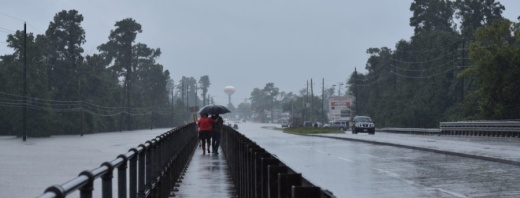The updated financial framework frees up the funds allocated for the drainage program in the county's $2.5 billion flood bond program so those funds can now be used on other flood control projects. The move is also the first step in chipping away that the county's bond deficit, officials said.
A March 9 presentation by the Harris County Budget Office showed a $1.4 billion funding deficit across the county's flood bond projects due to a lack of match funding. It also showed projects in the Greens Bayou, Halls Bayou and the San Jacinto River watersheds were less than 50% funded.
According to Russ Poppe, Harris County Flood Control District executive director, the deficit can largely be tied to a shift in how federal officials with the U.S. Department of Housing and Urban Development decided to make funding available to the state. Instead of giving the county a direct allocation of $1 billion in Hurricane Harvey relief funding, HUD decided last January to send relief money to the Texas General Land Office to be made available in the form of competitive grants. The move was opposed by Houston and Harris County leaders at the time.
In October, the HCFCD submitted nine grant applications for a total of about $900 million, Poppe said. The HCFCD could hear back around late April or early May on awards, he said.
In the event that the grants are not awarded, Harris County Commissioners Court unanimously authorized the budget office to implement a plan to fund the subdivision drainage program in its entirety through the reallocation of funds outside of the flood bond.
According to budget management department documents, the plan includes funding the subdivision drainage program with $115 million in county road bonds or surplus revenue from the Harris County Toll Road Authority. Another $200 million in needs could be filled by additional HCTRA surplus revenue or other county resources.
"These subdivision projects are quantified projects where we found a group of houses that flooded that were located outside the flood plain," county engineer John Blount said. "So it wasn't flooded because a bayou or river came up; it flooded because of internal drainage problems. So the thought process is, we—being road and bridge type-work—the engineering department would do that."
The drainage program will also be funded with the $230 million in HCTRA revenue that was previously transferred with each of the four precincts receiving 25%, or $57.5 million. If any precinct is unable to spend their its funding allocation on the subdivision drainage program, the remaining funds will be spent on other eligible flood control bond program projects with a transportation nexus.
"The hope is that GLO will come in and help us before we have to use either of those, but if they don't, we'll look at the HCTRA funds first and, if worst comes to worst, look at the road and bridge funds," County Judge Lina Hidalgo said. "This is what it's going to take—creativity. It's not fun to be in this position, but I'm proud of the way we're tackling it."
According to Blount, as of April 27, about 12% of the 91 total subdivision drainage projects are either under construction or ready for construction, and 50%-80% of projects are slated to be under construction by the end of 2021. Overall, the entire subdivision drainage program is expected to be completed within three years.
"I think this will demonstrate that we may not be able to fix all wrongs, but today we have made a significant dent in wrongs that were previously done and moving them in the right direction," Precinct 2 Commissioner Adrian Garcia said. "Today, chronic flood victims are finally going to get shovels in grounds in their neighborhoods, and I'm so proud of that."
The bigger picture
According to budget management department documents, the $115 million in flood control bond funding that was previously allocated for the subdivision drainage program will be reinvested so that the lack of available partner funding will not stall projects that have been prioritized by the county's equity-based "worst-first" framework.
While the deficit is now at less than $1 billion, the court agreed to continue to pursue the federal dollars county officials believe Harris County is due.
"What we're voting on today in no way means we're going to take the pressure off of trying to get that money. The pressure has got to come down hard from the left; it's got to come down hard from the right. My patience has run out [along] with everybody else," Precinct 3 Commissioner Tom Ramsey said. "The money needs to go where the damage has occurred, and the damage has occurred in Harris County."
Precinct 4 Commissioner Jack Cagle said even with the funding deficit, there is not a single flood bond project that is behind schedule.
"Nobody is yet in the zone of danger because every project is still on time," Cagle said. "We just need to do our jobs to make sure the money will be there when the projects are ready."
With or without the federal funds, the court agreed that the commitment county officials made to voters in 2018 would be fulfilled.
"We're going to do every project on the 2018 bond issue, period," Ramsey said. "We don't have all the details worked out [yet], but we're going to work out the details."
Shawn Arrajj contributed to this report.





